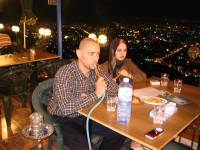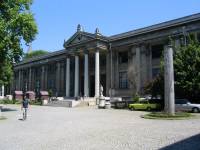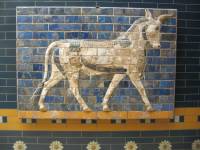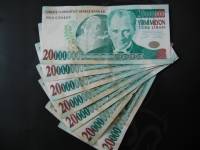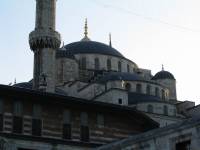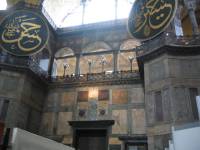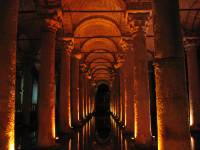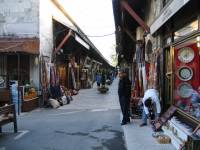The tour. There is too much to tell and I am too sleepy to go into detail. But here goes: For today I signed up for one of those cheesy tour groups. I know, I know! But I was touring by myself and figured, at least I'll have a guide and I can meet fellow tourists. Mistake. Anyway:
The tour bus was actually on time. Argh! The bus picked me up at 8:30 and we drove around picking up other tourists at their hotels. Then we drove to a central meeting place where a lot of touristy minibuses waited for us to join them. We existed the bus so we could be sorted by number, and someone presented me with a sticker for Tour #6. As I entered the #6 bus I surveyed the tour group. Mostly older people from European countries. Many spoke only German, so our tour guide introduced herself twice: "Hello, my name is Isha, and today we will be going to the Spice Market, on a cruise of the Bosporous, and the Rumeli Fortress. Then after lunch it's on to Dolmabahçe Palace, and across the Bosporous Bridge to Çamlica Hill. Guten Morgen, mine Name ist Isha...."
As the bus begins to move, she explains how Istanbul is divided into two parts, the European and the Asian side.
 The Spice Market
The Spice Market. After a warning about pickpockets I shifted my wallet to the front pocket. The Spice Market is located in an old building dating from the 1500s, and inside is about 100 shops selling teas and spices, tea cups, jewelry, Turkish Delight, etc. They have something called
adana that looks particularly unappetizing. Imagine a long stick of walnuts covered in a congealed syrup. It resembles nothing so much as a giant turd. Didn't try any!
Sales people reach out to shake your hand. It's a ruse, 'cause they don't let go easily. One Turk paid me a complement by addressing me in French. Who-hoo! I was able to fake him out with my substantial knowledge of French: "Bon jour... bien... non, merci!"
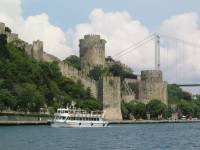 The Bosporous Cruise
The Bosporous Cruise. I have little to say about this abysmal experience. They herded us on to a boat and took us up and down the Bosporus; that is, between Europe and Asia. This was actually pretty cool for aout the first five minutes. After that I was just sleepy. The two sides look the same. On either side the land rises up sharply from the harbor. There is no sand. The land slopes up at a steep angle and is dotted with many trees. All along the sides are tan buildings with russet roofs.
 Rumeli Fortress
Rumeli Fortress. Probably the most intersting stop, it was of course the one were we spent the least amount of time. It was built to help conquor Constantinople. Now the walls are starting to crumble. The Turks added seats for a mini-amphitheatre. However, they haven't mowed the area in some time and we had to fight through some weeds...
Lunch. Best forgotten. We drove right past Dolmabahçe to spend an hour in traffic getting to the designated restaurant. Not fun. Chatted with a gay couple from the Netherlands. Their favorite places to tour are China and Italy; but they also really enjoyed Macau and Namibia. They asked me about Syria: aren't you concerned about dealing with customs? They told me about how US customs people didn't know where Macau was and they were very suspicious of that stamp! I explained that I expected to get scrutinized with a microscope but didn't care.
 Dolmabahçe Palace
Dolmabahçe Palace. This is the Palace used by the last few sultans. It is truly the Versailles of the East. After paying extra for my camera (6 million) and donning shower caps on my shoes, we entered the palace. There were more chandeliers than I could count, and each room was more opulent than the last.
Asia. After the palace we took the bridge across to Asia and spent a few minutes at a photo stop. To take a bridge from Europe to Asia seems strange.
Dinner. After buying a few postcards, took them to dinner at Acropol Byzas Cafe. Very fancy & a little expensive. I filled out the postcards as I ate and then came back to the room.















